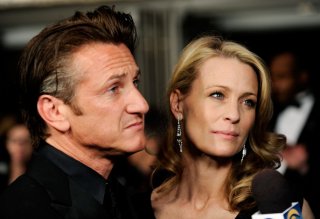It’s Robin Wright Penn’s tantalizing elusiveness that keeps her in the ranks of A-list female stars even though she could hardly be less interested in that kind of status. Ask any fan (our name is legion), and they’ll tell you that the delicious thing about Wright Penn is that you can’t get enough of her. She won’t let you. Whether she’s playing the defiantly pregnant and single young Irishwoman in The Playboys (1992) or the garish, gun-toting foster mother who loves sex and Jesus (in that order) in White Oleander, what keeps you coming back for more is the way she subtly imbues her characters with such depths that, try as you may, you can never fully plumb them. They remain slightly mysterious, just like people do in real life. Wright Penn is also elusive in a more literal sense: While happy to dive into interesting roles in small movies, she’s famous for passing up such big deals as Jurassic Park, Batman Forever, Born on the Fourth of July, and The Firm. “I turned down Panic Room, too,” she says musingly. “It’s a great film, great for that genre. But I have to connect on a heart level. Is this part of my tribe? Is this character my breed? If the breed and the tribe ain’t talkin’ to ya, then you’re not going to bring much to it.”
If ever there were a role fluent in her heart’s private patois, it’s the title character of Rebecca Miller’s inspired update of “the women’s picture,” this month’s The Private Lives of Pippa Lee. Wright Penn has played her share of wives and girlfriends, for the most part interesting, even fascinating women, but secondary to their men. Now she’s breaking out. Pippa is a wife too, the dutiful trophy of a much older man (Alan Arkin), but she’s having her own breakout, and Wright Penn gets to blossom as never before in a role that ranges from quiet brooding to loose-limbed sexual comedy. When she first read the script, she says, “It felt like: Oh! I’m home.” Describing her work, Miller calls Wright Penn “an actress completely, fully there and brave. There’s no sense of selfishness or cut-offness, where you’re almost keeping the performance to yourself.” That quality surfaced early in Wright Penn’s first big break, playing another title role, that of Buttercup in The Princess Bride. Rob Reiner’s comic fairy tale is a delight—except for the scene in which hero Cary Elwes does battle with the Rodents of Unusual Size while Buttercup shrieks and dithers. Reiner failed to see that Wright Penn’s princess was such a sturdy girl, you just know she’d be in there whaling, not wailing, away.






















 heart:
heart: